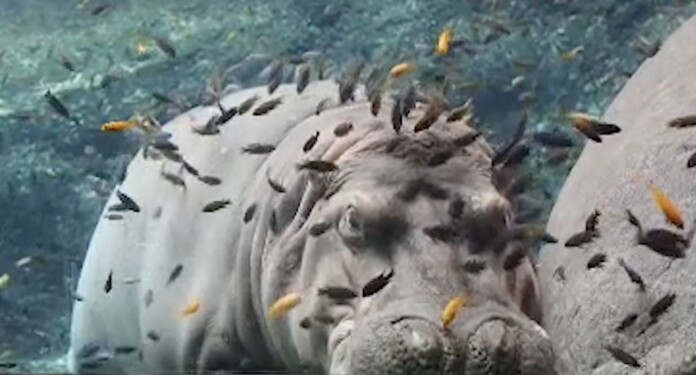Moo Deng, a two-month-old pygmy hippo, has quickly become an internet sensation, attracting a surge of visitors to Khao Kheow Open Zoo in Thailand.
Her tiny, chubby frame has inspired a devoted fanbase, with videos of her circulating widely on social media. The zoo’s TikTok account, which features clips of Moo Deng, now boasts 2.5 million followers.
The baby hippo‘s fame has even extended to the Royal Thai Embassy’s social media channels, and fans have created artwork and cakes in her image. One cosmetics company even encouraged customers to “wear your blush like a baby hippo.”
Despite her widespread appeal, Moo Deng has also become the subject of controversy. Some zoo visitors have mistreated the baby hippo, filming themselves pouring water on her to wake her up and even throwing objects at her.
These disturbing acts of cruelty have sparked outrage online. Khao Kheow Open Zoo’s director, Narongwit Chodchoi, condemned the actions, warning that those responsible could face legal consequences.
He emphasized that such behavior is not only cruel but also dangerous. To address the issue, the zoo has installed CCTV cameras and urged visitors to see Moo Deng during her waking hours, as the baby hippo spends much of her time sleeping and drinking her mother’s milk.
Zookeeper Atthapon Nundee, who was instrumental in making Moo Deng a social media sensation, expressed surprise at her international fame.
“I thought she could be famous in Thailand but not internationally,” he said. At just two months old and weighing 20kg, Moo Deng is expected to start eating grass soon. Pygmy hippos, native to West Africa, are classified as endangered, with fewer than 3,000 believed to be left in the wild.
This article by Trinity Sparke was first published by One Green Planet on 17 September 2024. Image Credit :Tikling/Shutterstock.
What you can do
Help to save wildlife by donating as little as $1 – It only takes a minute.




Leave a Reply